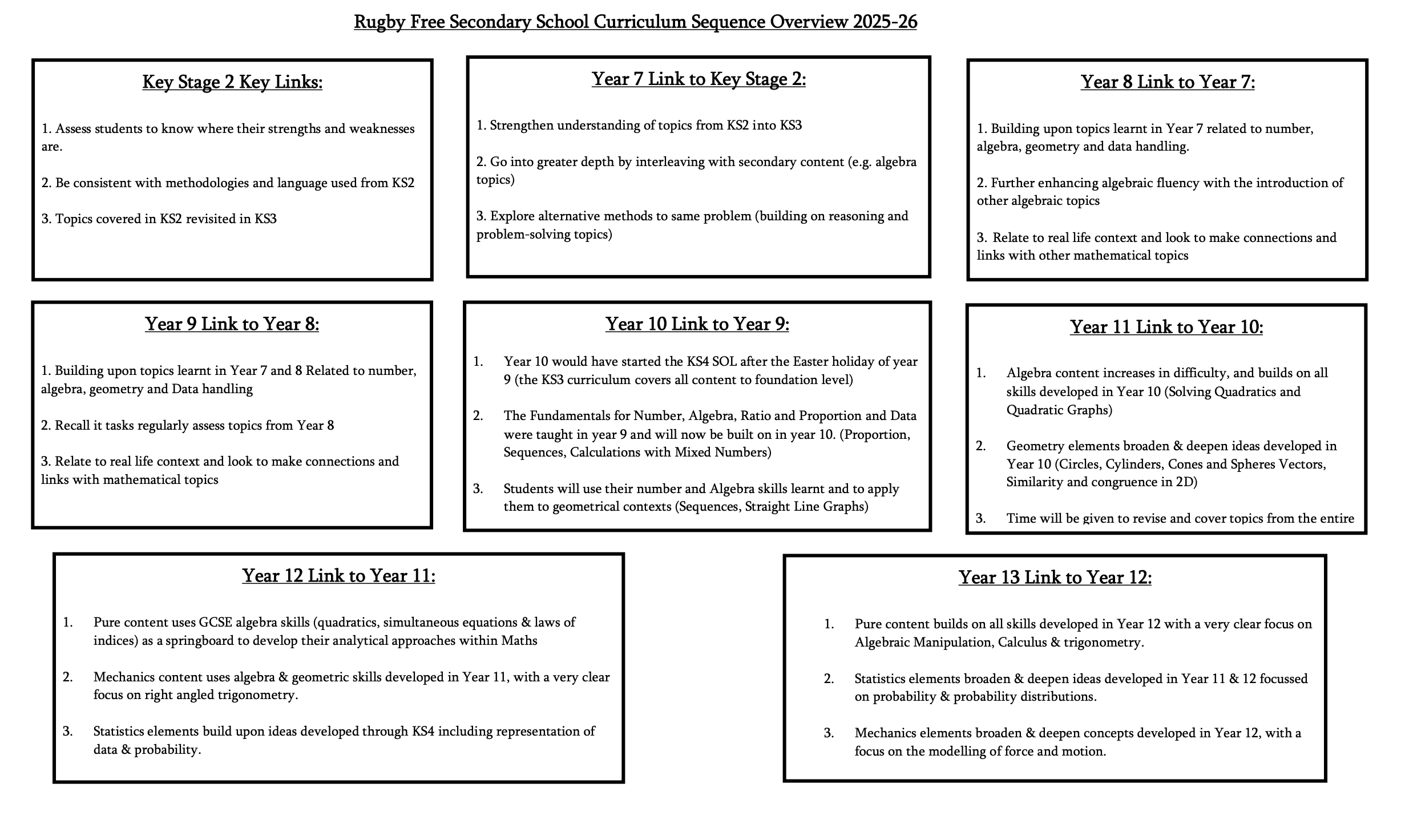Mathematics Department – Overarching Curriculum Intent (September 2025)
RFSS Curriculum Vision Statement:
To build an inclusive curriculum that is aspirational for all and empowers our students to make outstanding academic and personal progress.
Mathematics Curriculum in Context:
Our aim is to develop our students to be intellectually curious, to enjoy the subject and to be able to use their mathematical skills to understand the world around them – both locally and globally. At Rugby Free Secondary School our curriculum is designed to stretch, challenge and support our students so that they receive a high-quality mathematics education and feel mathematically confident. The curriculum will enable the students to recall and apply facts and knowledge, to become fluent in the fundamentals of mathematics through varied and frequent practice, and to develop students’ ability to reason mathematically, so that they have the ability to solve problems that they may come across in the real world, whether now, or in the future.
Mathematics is a creative and highly interconnected discipline that has been developed over centuries, providing the solution to some of history’s most intriguing problems. It is essential to everyday life, critical to science, technology and engineering, and necessary for financial literacy and most forms of employment.
We have found in recent times that we are dealing with greater gaps in knowledge from KS2, with fewer students being “secondary” ready at the start of Y7. More significantly, we have seen an increase in the lack of confidence shown towards the subject, with students requiring greater reassurance when learning new content, and when recalling previously taught topics. Parents and carers also hold this insecurity towards mathematics, and therefore feel less confident in supporting their child with the mathematics being taught to them, which only widens the gap still further.
Curriculum Aims:
Our curriculum aims to:
- Give students he ability to think critically about mathematics and communicate confidently, through their numeracy, oracy. and writing
- Give students the tools to support, evaluate and challenge their own and others’ views through questioning, and using detailed mathematical evidence derived from a range of contexts.
- Empower our students to:
-
-
- Know more about the maths we study and its appropriate contexts
- Remember more about the methods used, and to be able to recall these skills independently
- Do more by applying this knowledge regularly in their own independent practice.
-
-
Our broad and balanced curriculum concentrates on developing our students’ key knowledge and skills, and enhances their understanding of the world around them.
We do this by:
- Offering a wide variety of interesting, fun and compelling learning activities.
- Making sure reasoning questions are embedded into the schemes of work in KS3 so that it is clear to what level teachers should be taking discussion and learning to in their classrooms.
- Tailoring the pitch of lessons to suit the needs of the students within each class through clear differentiation whilst ensuring clearly defined end-points are reached in each unit of work.
- Making sure topics are regularly revisited and expanded upon over the course of KS3/4. A robust and regular assessment structure is used to help students reflect on their previous learning and knowledge.
- Maintaining a systematic quality assurance approach to ensure the maximum impact of student knowledge and progress.
- Emphasising that the use of accurate mathematical vocabulary is paramount to successful maths teaching, and therefore the learner’s progression through the subject
- Using Home Learning effectively in Key Stage 3 to consolidate students understanding of topics covered in lessons. In Key Stage 4, Home Learning is developed to not only consolidate students learning from the classroom, but also broaden and extend student understanding, and to ensure that students are exam ready.
Our curriculum is focused on the development of communication, character and cultural capital of each individual student, so they become:
- Empathetic citizens who understand the power and importance of numeracy in society
- Resilient learners who reflect on their work, and the work of others, diligently, in order to make progress
- Creative thinkers who challenge and develop interpretations, and reflect this nuanced understanding in the way they approach mathematical problems
- Articulate individuals who can verbalise their own mathematical thoughts, ideas and arguments
- Hard-working students who are committed to fully developing and exploring their ideas.
Curriculum Outcome:
As a result of our curriculum, students will leave RFSS competent with their numeracy skills, and be able to use the problem-solving skills that they have learnt in mathematics in way which can be adapted to many problems beyond the classroom. They will also be empowered in their thinking, viewing the world through a critical lens of mathematics, and understanding that their voices have the power to change it in social, political, cultural and economic contexts.

